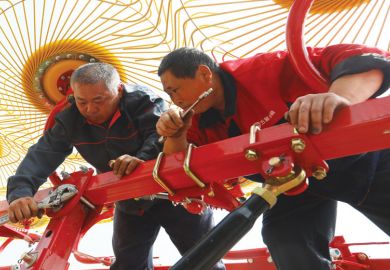One of the biggest controversies in developmental science has been the extent to which environmental and genetic factors contribute to development. John Locke believed the young child to be a tabula rasa, with development being a continuous process of shaping through experience, whereas Granville Stanley Hall, influenced by Darwin, held that development was predominantly driven by genetic predispositions.
Although the nature-versus-nurture question reigned supreme in developmental psychology for many years, the accepted view nowadays is that development is a result of interaction between genetic and environmental factors. This is not necessarily the case for educationists.
Developmental psychologists study the many different factors that shape development, whereas educationists, on the whole, focus on the environmental factors that influence how children learn within formal educational settings. When it comes to understanding how children learn, educationists view genetic factors as taboo. An example of this disbelief in any genetic contribution to learning can be evinced in their reference to "learning styles" rather than learning ability. This implies that an individual's learning is based on the style of teaching rather than on their ability to learn. In other words, if children fail to learn it is the learning system that is at fault rather than the child's ability to learn. Taking this view, genetics are irrelevant to learning.
So, how does this style of thinking fit in with the kind of research conducted by developmental psychologists? What are the possibilities of applying the findings from developmental psychological research to the classroom given the differences in viewpoint? Developmental psychology is concerned predominantly with the changes that occur during infancy and childhood in typical and atypical populations. Research focuses on areas such as motor development, language acquisition and communication, categorisation and conceptual understanding, problem-solving, attachment and social development. A key question is whether development is a continuous process across all domains of knowledge or whether there are stages of development that differ according to the domain.
Although developmental research can inform educationists, little of what is taught in schools is based directly on what developmental psychologists have learnt about growth. Developmental psychology focuses on how different abilities increase with age, whereas educational psychologists focus on interventions in teaching, the psychology involved in teaching and the social psychological aspects of teaching environments.
Of course, there are times when developmental research does affect teaching, particularly when it involves teaching children with developmental disorders. But, despite both disciplines' concern with child development, there is little overlap in the research or application of it. So, have there been great advances in bringing the two areas of research closer together? In reading the three journals under review, it is not immediately apparent that there have been. Although each of the journals publishes child-focused research, their style and reporting of research differ. The Journal of Early Childhood Literacy (JECL) and the Journal of Early Childhood Research (JECR) have a curriculum bias, whereas the European Journal of Developmental Psychology (EJDP) is predominantly a combination of cognitive and social developmental experimental psychology.
My main concern with much of the research reported in the JECR , and to some extent that published in the JECL , is the failure to distinguish between the behaviour under observation and the underlying processes governing that behaviour. This is fundamental to understanding child development. There is a distinct difference between a child's behaviour, the content of their knowledge and the processes by which they acquired that knowledge. It is easy to observe behaviour and conclude a level of competence that may or may not be there.
As an example, take the 1975 block-balancing task of Annette Karmiloff-Smith and Barbel Inhelder. Children between the ages of four and nine years had to balance blocks that were unevenly weighted. The four-year-old and the nine-year-old children managed to balance the blocks, whereas the seven-year-olds repeatedly tried to balance the blocks at their geometric centre. To all outward appearances, it would seem that the four-year-olds and the nine-year-olds had the same level of ability. But this would be a false belief. The four-year-olds, having no knowledge of torque, were able to feel for where the blocks balanced. The seven-year-olds, having some knowledge of torque, were rigid in their thinking and unable to try alternatives. The nine-year-olds also knew about things balancing at their geometric centre, but on trying it they realised that this was not the case for these particular blocks. Thus, to assume knowledge from observing behaviour may result in making a fundamental attribution error.
It should be clear that simply using observation is not particularly informative as to the content of a child's knowledge. But is it enough to discover the content of knowledge without understanding the process by which children acquire that knowledge? I think not. Take theory of mind experiments, which have shown the age at which children begin to understand that other people have thoughts and feelings that may be different from their own. This type of research is far more informative than simply observing behaviour, as now we have some understanding of the content of the child's knowledge.
Yet we still do not really know the processes by which this kind of knowledge developed. To get some insight as to the processes that drive knowledge and behaviour, we devise theories. So science is theory driven. Or it should be.
The trouble with much of the research reported in the JECR is that it is descriptive with little reference to theory. For instance, a hot topic at the moment is childhood obesity. In one article, Kathleen Sellers et al ran three focus groups with childcare providers to determine their beliefs about healthy eating and lifestyle and to devise ways in which the carers could help children achieve a healthier lifestyle. There is no theory behind this study. It is simply a look at how a small number of childcare providers think about healthy living. At the very least, I would have liked to have known how many participants looked after clinically obese children. If none of the children had weight problems, I do not see the point of this study. Such research is trivial, but it is worrying that it has been through the peer-review process and is deemed acceptable for publication.
There are some interesting articles in this journal, but they do not make up for its general descriptive nature. The JECL is a window on a seemingly closed and narrow academic world that, despite the editors' wishes for the journal to be a melting pot of interdisciplinary research, struggles to find a place or a voice relevant to applied teaching practice or to psychological development.
For example, Bronwyn Davies discusses two versions of the story The Fairy Who Wouldn't Fly . The first version was written by Pixie O'Harris in 1945, and it was retold by David Harris in 1974. Davies uses the story as a means of examining the ways in which children are portrayed in stories and how this changes with time. I enjoyed reading this article, but at the end I was left thinking "so what?". This article is not strictly typical in content, but it illustrates the type of verbiage used with little or no application to good literacy teaching practice common in this journal.
Of the three journals reviewed, the EJDP is the only truly developmental journal. Of course, the other two do not purport to be developmental, simply child focused. But I am unclear how early childhood research can be anything other than developmental.
I suppose I am more comfortable with the kind of research carried out in the EJDP . Most of it is theory driven, with clear hypotheses and results. Not all the papers are experimental, but they are theory based, unlike much of the research in the other two journals.
An article by Nadja Reissland et al looked at how the mood of mothers affects their infants' play behaviour and eye gaze. Infants of depressed mothers showed more negative expressions and less eye contact. A second paper also examined infants' eye gaze during social interaction. Here, Sarah Dunphy-Lelii and Henry Wellman hypothesised that 14 and 18-month-old infants would be able to comprehend the referential characteristics of looking. They tested infants' ability to follow the eyes of an experimenter under three conditions: no barrier, clear barrier and opaque barrier. If infants understood the referential nature of following eye gaze, they should look only in the clear and no-barrier conditions, which is what the authors found. Both these articles examine situations in which infants use social cues to modify their looking behaviour. The studies are substantially different, yet both shed light on social communicative development during infancy.
Despite the array of articles on development in this journal, an underlying social developmental thread runs through most of them. This gives the reader a sense of coherence - something that is decidedly lacking in both the JECR and JECL .
As the field stands, the difference between developmental research and educational research seems to be widening. Schools and universities are obsessed with curriculum design and learning aims. Educationists are no longer interested in development but in "learning development", whatever that may mean. Children's literacy is an area crying out for succinct applied research, which unfortunately the JECL is not alone in lacking. Likewise, there is a need for good research in teaching practice.
There are many simple intuitive questions about teaching practice that neither the JECL nor the JECR comes close to addressing, never mind answering. If you want to understand how children develop, there are a number of excellent developmental journals out there, which have now been joined by the EJDP .
Janine Spencer is lecturer in developmental psychology, Brunel University.
Journal of Early Childhood Research
Editor - Carol Aubrey, Cathy Nutbrown and Peter Tymms
Publisher - Sage, three times a year
Price - Institutions £254.00 Individuals £34.00
ISSN - 1476 718X
Register to continue
Why register?
- Registration is free and only takes a moment
- Once registered, you can read 3 articles a month
- Sign up for our newsletter
Subscribe
Or subscribe for unlimited access to:
- Unlimited access to news, views, insights & reviews
- Digital editions
- Digital access to THE’s university and college rankings analysis
Already registered or a current subscriber?



